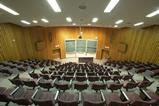Find out how a secondary school teacher and HE lecturer view the situation for chemistry education in the UK right now

Kristy Turner: Schools in the UK close at the end of today – Ireland’s schools are already closed of course – for everyone except the children of keyworkers and those who are considered vulnerable. Over the last week or so at my school we’ve been exploring different options for supporting students should we have to close, this is now very real. My school has quite a lot of parents who are keyworkers, so I know school will remain open in some form. I will be taking my turn on the school supervision of keyworker children.
My daughter is at primary school and I’m classed as a keyworker, so she’ll be in school, although I don’t want her in more than necessary to try to avoid spreading the virus.
Our support staff, such as IT services and learning technologists, are doing phenomenal work to support academics
Katherine Haxton: Universities have cancelled, or are in the process of cancelling, face-to-face teaching, transitioning to distance learning methods, and determining what level of service staff and students can expect. There’s lots of emailing, but our situation is simpler than in schools because many vice chancellors have already set decisive courses of action – at least until the Easter holiday.
What are your concerns for the next weeks and months?
Kristy: I worry about the sustainability of motivation over the next few months. I don’t know how students will maintain their focus over a number of weeks. The novelty factor will help at the start, but after a while, I think we will all get fatigued.
The younger boys are to a certain extent still ‘learning to learn’. They are used to having that motivating factor of a teacher in the room. I don’t think a teacher at the end of a video call will be quite as effective.
Humans are social animals, teenagers especially so, and it will be difficult to move forward without those small human interactions that make up our day-to-day lives.
Katherine: Motivation and retaining focus is going to be our key issue in HE and burnout is a real risk for staff who are supporting this transition to distance learning. The uncertainty and inability to make medium- to long-term plans will also be a source of fatigue for staff.
Many staff are viewing this as an opportunity to develop new methods of engaging, others are mainly trying to shift their normal practice into a virtual environment and stick to the timetable. Our support staff, such as IT services and learning technologists, are doing phenomenal work to support academics.
From the student side, I worry about their degree of self-sufficiency. Shifting halfway through a semester to a completely different way of learning without their peer-support network is extremely challenging. Ideally, we would not have students developing those types of self-sufficiency skills at the same time as finishing their degree programmes.
I am also concerned about the assumptions we may be making about the availability of computer and internet access for our students. While many families will have a computer and internet access, competing with younger siblings trying to do their schoolwork and the adults trying to work from home may be a significant timetabling issue. It’s important to survey students and to ensure we continue to support the diverse backgrounds of our learners.
Have your say
Add your views and concerns by commenting at the bottom of this article. And join in the conversation on Twitter.
And what about exams?
Kristy: Exams are a huge source of speculation at the moment. GCSEs and A-levels are critical to students for their next steps to FE, HE and work.
There have been calls to just use teacher assessments, but we know these are notoriously biased. I have already heard rumours of schools putting students through ‘easy mocks’ so they have evidence in case mock results are used in place of real results. This is a sad indictment of the current culture in lots of schools.
The announcement that exams are cancelled is rather ambiguous, we really need clarity on this
My hope was that exams run as usual, assuming everyone is well enough to sit them and we have enough staff to supervise. We know the typical grade profile and results can be scaled to fit that. Lots of schools had already finished teaching new content to exam courses so perhaps we’ll go back to a simpler time, when schools didn’t put on endless revision lessons for students and they had to develop independence.
The announcement that exams are cancelled in May and June for England, Wales and Scotland is rather ambiguous, we really need clarity on this [the government is expected to announce its plan for England and Wales today]. I am signed up to mark exams this summer, I know first-hand how tight the deadlines are. It’s difficult to see how these can be shifted.
Katherine: We are bound to assess all learning outcomes, but many institutions have or are making provision to replace unseen exams with online exams or other activities. Any assessment methods requiring attendance will ultimately need to be modified in some way. I personally would welcome that challenge, but I know there is apprehension about how that approach would be viewed by the RSC from an accreditation standpoint.
How about practical work?
Kristy: Teaching will be simpler in lots of ways, without the additional challenge that practical work brings. But students and teachers will miss it. It helps students to place their learning in context, provides variety to their day and helps develop lots of skills a textbook or screen cannot replicate. I will be getting students to make acid-base indicators and will think about how we can use materials and equipment we’ll all have at home to continue some practical work. There are some online experiments and videos which are useful for older students.
What tools are you using in remote learning?
Katherine: I have a tablet PC with screen recording software that allows me to produce screencasts on key topics. My philosophy is to keep it simple and short; multiple short videos are preferable to one long one. Items that can be packaged for download as well as streaming are preferable to expecting all students to be able to access online resources all the time.
This is where being a hoarder is useful!
Some colleagues are attending their scheduled lecture slots and presenting to empty rooms using built-in lecture capture facilities, which means that content will be available in familiar ways for the students and without additional effort for the staff. Of course that requires attending campus and may not be possible for all.
Kristy: I am lucky my school is already well set up with technology, all our staff and boys have iPads that are controlled by the school system. I have some screencasts I did a few years ago which I can reuse and I am also recording more using Explain everything. I already know how to use Zoom for videoconferencing.
I was setting some things up on Microsoft Teams, but it turned out the school settings meant its functionality was blocked so that was frustrating. We also have Showbie, which allows me to set assignments online, receive submissions and give feedback.
Classes from year 9 upwards have access to an online textbook and I am going to give a physical textbook to my younger classes. The textbook I am going to give year 8 was written in 1984 and last issued to students in 1996 – this is where being a hoarder is useful! The chemistry hasn’t changed and the books are actually refreshingly uncluttered with strong explanations.
How confident are you in your ability to use these tools?
Kristy: There are advantages to being fully immersed in the chemistry education community, I feel well prepared to support my students if we can’t be in class together.
Perhaps we’ll all come out of this with a greater appreciation for our face-to-face teaching
Katherine: My interest in learning technology, particularly in lecture capture, means I am well equipped to support remote/distance learning. It’s not my ability that concerns me, but how the product of these tools will be used by the students. It would be very easy to put a lot of effort into learning objects that are not well used.
What measures are in place to support diverse learners?
Katherine: This is my major concern. Many of our students will be dealing with mental health conditions and these may be exacerbated by the current situation.
Students who have support workers may find themselves having to navigate new arrangements to access help and complete assignments, and students with disabilities who have reasonable adjustments to access examinations may have to adapt rapidly to unfamiliar assessment forms. This requires significant monitoring and adaptability, but a good principle is that if it is appropriate for your students with learning difficulties and disabilities, it should be OK for all students.
Are there any positive aspects of the current situation?
Kristy: I think it is making people think about how necessary much of what we do is because the first thought in all of this is ‘what is best for the student?’ Education really should be that simple, but sometimes it gets lost. Perhaps we’ll all come out of this with a greater appreciation for our face-to-face teaching and a simpler approach to everything we do.
Katherine: I’m hoping to be able to create resources that I can use in the future to support peer instruction. I’m also finding it’s encouraging me to think more creatively about assessment methods and further refine the content I need to cover to pull out key concepts that will be valuable in students developing their ‘think like a chemist’ skills.
If you could only save one thing from your working environment to be able to teach from home, what would it be and why?
Katherine: Quiet half hours in the campus coffee shop reviewing lecture notes before delivery.
Kristy: Colleagues. I am an extrovert. I enjoy talking to my colleagues – teachers and support staff. That won’t be the same online.












![Lecture capture shutterstock 346398389 300tb[1]](https://d1ymz67w5raq8g.cloudfront.net/Pictures/159x106/5/9/5/113595_lecturecapture_shutterstock_346398389_300tb1.jpg)






1 Reader's comment